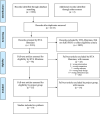Sleep deprivation as treatment for depression: Systematic review and meta-analysis
- PMID: 33145770
- PMCID: PMC7839702
- DOI: 10.1111/acps.13253
Sleep deprivation as treatment for depression: Systematic review and meta-analysis
Abstract
Objective: To systematically review evidence on the efficacy and safety of sleep deprivation (SD) as a treatment option for patients with unipolar or bipolar depression.
Methods: A systematic review according to PRISMA guidelines was conducted. The certainty of evidence was assessed using the GRADE approach. Controlled trials were included in efficacy analysis, case series for evaluating complications and qualitative studies for patients' experiences.
Results: Eight controlled studies (368 patients), one qualitative study and seven case series (825 patients) were included. One week after treatment start, SD combined with standard treatment did not reduce depressive symptoms compared with standard treatment (standardized mean difference, SMD = -0.29, [95% confidence interval, CI: -0.84 to 0.25], p = 0.29). When excluding a study in elderly patients in a post hoc analysis, the difference was statistically significant (SMD = -0.54 ([95% CI: -0.86 to -0.22], p < 0.001)) but it diminished two weeks after treatment start. No superiority of SD was found compared with antidepressants, but SD may be superior to exercise in certain settings. It is uncertain whether SD affects quality of sleep, quality of life, everyday functioning or length of stay. Apart from switch to mania (ranging between 2.7% and 10.7%), no other serious complications were reported.
Conclusion: Sleep deprivation has been studied in a wide range of settings resulting in divergent results for the short-term efficacy on depressive symptoms. Post hoc analyses indicated that there may be a significant but transient effect in certain populations. Further studies should focus on identifying subgroups of responders as well as examining feasibility in routine clinical care.
Keywords: bipolar syndrome; chronotherapy; depression; meta-analysis; systematic review.
© 2020 The Authors. Acta Psychiatrica Scandinavica published by John Wiley & Sons Ltd.
Conflict of interest statement
The authors have no conflict of interest to declare in relation to the present work.
Figures
Similar articles
-
Exercise therapy for chronic fatigue syndrome.Cochrane Database Syst Rev. 2019 Oct 2;10(10):CD003200. doi: 10.1002/14651858.CD003200.pub8. Cochrane Database Syst Rev. 2019. Update in: Cochrane Database Syst Rev. 2024 Dec 19;12:CD003200. doi: 10.1002/14651858.CD003200.pub9. PMID: 31577366 Free PMC article. Updated. Review.
-
Mobile apps to reduce depressive symptoms and alcohol use in youth: A systematic review and meta-analysis: A systematic review.Campbell Syst Rev. 2024 Apr 26;20(2):e1398. doi: 10.1002/cl2.1398. eCollection 2024 Jun. Campbell Syst Rev. 2024. PMID: 38680950 Free PMC article. Review.
-
Novel Augmentation Strategies in Major Depression.Dan Med J. 2017 Apr;64(4):B5338. Dan Med J. 2017. PMID: 28385173 Review.
-
Efficacy of Triple Chronotherapy in unipolar and bipolar depression: A systematic review of the available evidence.J Affect Disord. 2020 Nov 1;276:297-304. doi: 10.1016/j.jad.2020.07.026. Epub 2020 Jul 15. J Affect Disord. 2020. PMID: 32697712
-
Antidepressants for the treatment of depression in people with cancer.Cochrane Database Syst Rev. 2023 Mar 31;3(3):CD011006. doi: 10.1002/14651858.CD011006.pub4. Cochrane Database Syst Rev. 2023. PMID: 36999619 Free PMC article. Review.
Cited by
-
Effects of dynamic bedroom lighting on measures of sleep and circadian rest-activity rhythm in inpatients with major depressive disorder.Sci Rep. 2022 Apr 12;12(1):6137. doi: 10.1038/s41598-022-10161-8. Sci Rep. 2022. PMID: 35414714 Free PMC article. Clinical Trial.
-
Meta-Analysis of Sleep Deprivation Effects on Patients With Depression.Front Psychiatry. 2021 Nov 30;12:783091. doi: 10.3389/fpsyt.2021.783091. eCollection 2021. Front Psychiatry. 2021. PMID: 34916978 Free PMC article.
-
Psychotomimetic compensation versus sensitization.Pharmacol Res Perspect. 2024 Aug;12(4):e1217. doi: 10.1002/prp2.1217. Pharmacol Res Perspect. 2024. PMID: 38923845 Free PMC article. Review.
-
Role of adjunctive nonpharmacological strategies for treatment of rapid-cycling bipolar disorder.World J Psychiatry. 2023 Aug 19;13(8):495-510. doi: 10.5498/wjp.v13.i8.495. eCollection 2023 Aug 19. World J Psychiatry. 2023. PMID: 37701540 Free PMC article. Review.
-
Detecting activities of multiple neurotrophins to see the complex effect of acute sleep deprivation on mood and behavior in humans.Sleep Biol Rhythms. 2021 Nov 26;20(1):1-2. doi: 10.1007/s41105-021-00356-3. eCollection 2022 Jan. Sleep Biol Rhythms. 2021. PMID: 38469071 Free PMC article. No abstract available.
References
-
- WHO . Depression and Other Common Mental Disorders: Global Health Estimates. Geneva, Switzerland: World Health Organization; 2017. Report No.: WHO/MSD/MER/2017.2.
-
- Liu Q, He H, Yang J, Feng X, Zhao F, Lyu J. Changes in the global burden of depression from 1990 to 2017: findings from the Global Burden of Disease study. J Psychiatr Res. 2020;2017:134‐140. - PubMed
-
- Rush AJ, Trivedi MH, Wisniewski SR, et al. Acute and longer‐term outcomes in depressed outpatients requiring one or several treatment steps: a STAR*D report. Am J Psychiatry. 2006;163(11):1905‐1917. - PubMed
Publication types
MeSH terms
Substances
LinkOut - more resources
Full Text Sources
Medical



